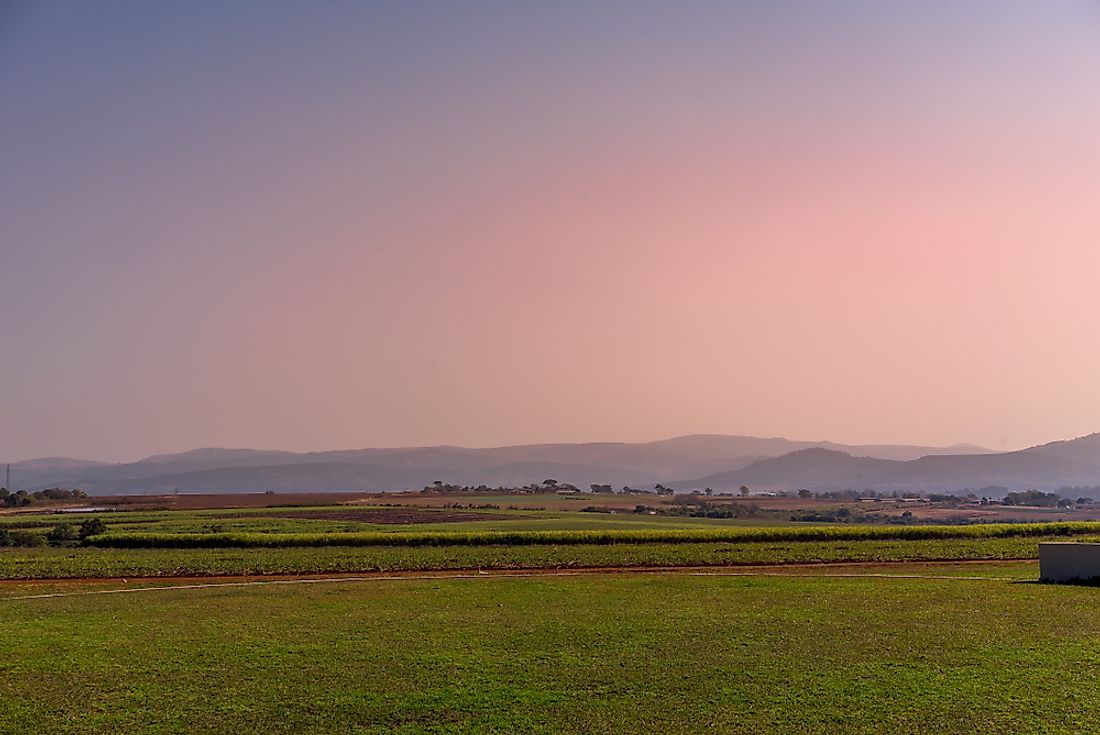What Are The Major Natural Resources Of Swaziland?

Swaziland (now Eswatini) is a country found in southern Africa. It is considered to be one of the wealthiest nations in the world in terms of natural resources. Due to the wide array of natural resources within Eswatini, its economy is among the most diversified in the region. Despite the diversification of the Eswatini economy, its gross domestic product is among the lowest ranked in the world and in 2017 it was the 153rd highest at $4.41 billion. On the other hand, the Eswatini per capita gross domestic product was only the 113th highest in the world.
Arable Land
In 2014, the size of arable land in Eswatini was roughly 10.17% of the country's total land area. Arable land has been vital to the Eswatini people since ancient times because they primarily practiced agriculture. In the modern era, arable land is still essential to the Eswatini people and agriculture is one of the leading industries in the country. The Eswatini labor department estimated that roughly 70% of the country's labor force was employed in the agricultural sector. Even though most of the Eswatini labor force worked in the agriculture industry, it only contributed 8.2% of the country's gross domestic product in 2011. Some of Eswatini's most important crops include sugarcane, corn, and citrus fruits. Agriculture in Eswatini is practiced on both small scales and large scales with most local farmers engaging in small-scale farming while foreign investors engage in large scale. The country’s agriculture sector faces several challenges with the most significant one being the variation in climatic conditions that limit the number of crops that farmers can harvest. The Eswatini government has put in place several measures to revitalize the country's agriculture industry such as educating farmers on modern agricultural techniques and subsidizing farm implements to reduce the cost of production.
Sugarcane
One of Eswatini's most vital crops is sugarcane which is primarily grown in the low veld region. Eswatini is Africa’s fourth largest producer of sugar and the 25th largest globally. Royal Swaziland Sugar Corporation (RSSC) is the largest company producing sugar in the country and has output of almost two-thirds of the country’s sugar. The company also provides employment to about 3,000 people in the country. The company also produces about 430,000 tons of cane every season. Ubombo Sugar Ltd is the second largest producer of sugar in the country. Data indicated that sugarcane output in Eswatini has increased at a rapid rate because sugarcane farming is considered extremely lucrative. Most of Mswati's sugarcane is processed at sugar mills and later sold to other nations such as South Africa and Lesotho, the US, and the EU. Eswatini farmers can take advantage of the trading partnerships that the country has signed to access a broader market for their crop. Eswatini sugarcane farmers face several challenges with the most significant one being the diseases that affect their crops.
Livestock
Eswatini farmers keep a wide variety of animals such as cattle, goats, and sheep. Livestock in Eswatini, primarily cattle, plays a vital cultural role since it is considered the measure of an individual's wealth. In 1996, the Eswatini government estimated that there were more than 600,000 cattle in the country most of which were kept for beef.
Forests
In 2010, approximately 33% of Eswatini was covered with forests according to data from the UN. The data also indicated that from 1999 to 2010, Eswatini lost roughly 0.96% of its forests. The forestry sector is one of the most essential to the Eswatini economy primarily due to a large number of people who are employed in the forestry sector. Eswatini timber is used both locally and internationally, earning the country foreign currency. The Eswatini forests are also important due to the tremendous ecological role that they play. Several challenges face the Eswatini forestry sector such as outbreaks of wildfires, diseases, and pests. The Eswatini government has partnered with foreign nations as well as international organizations to improve the country's forestry sector.
Fish
Because Eswatini is a landlocked nation, it lacks vast fishery resources. Most of the fishing in the country carried out in dams such as the Sand River Dam, Hendrick Van Eck Dam, and Maguga Dam. The most common varieties of fish in Eswatini include catfish and tilapia. Eswatini is a popular destination for sports fishers most of whom visit the country to fish in the Maguga dam which is home to the largemouth bass. A large number of sports fishers who visit the Maguga Dam has led to the construction of a luxury resort close to the dam.
Minerals
Eswatini has been endowed with a wide array of valuable minerals such as diamonds, coal, and gold among others. The Eswatini mining industry, like other major industries in the country, is primarily controlled by the King who has delegated his responsibility to the Minerals Committee. The Eswatini government estimated that the mining industry contributed roughly 2% of the country's gross domestic product. Most of the minerals produced in Eswatini are sold to other nations, and the government estimated that mineral exports made up 2% of the country's total exports. Eswatini's mining industry faces several challenges with the primary one being the fluctuation in the global prices of some minerals.
Gold
Historically, gold mining was one of the most important activities carried out in Eswatini. During the colonial era, gold mining began in the early 1880s. Currently, the country's gold production has declined due to the depletion of gold deposits. The Eswatini government has attempted to revitalize its gold mining sector through reopening the Lufafa gold mine in 2016. The Eswatini government also allowed the construction of a gold treatment facility near the reopened mine. The government expects that the development of the facility would increase the amount of gold produced in the country.
The Eswatini Economy
The Eswatini government has put in place several measures to grow the country's economy such as encouraging foreign investment and improving the country's education facilities. The Eswatini economy faces some challenges such as the country's high poverty rate which was estimated to be 63% in 2017. The massive number of Eswatini people living with HIV is also a significant challenge facing the Swazi economy.











